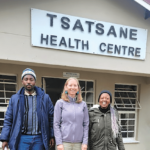Ntsoaki Motaung
In every community, residents eagerly anticipate infrastructure and service delivery improvements.
The Marakabei and Monontša communities in Botha Bothe were no exception; they celebrated the construction of a new road connecting their communities, unaware that it would also bring about distressing consequences.
District Administrator (DA) Quthing Tšepa Chaba revealed that the road construction from Marakabei to Monontša has contributed to a rise in mental health cases within the communities.
This alarming information was shared during last week’s Mental Health Day commemoration in Qholaqhoe, organised by the Ministry of Health and its partners.
Chaba noted a significant increase in mental health cases, particularly among residents of Marakabei and Monontša. He pointed out that infrastructure projects often lead to challenges for local communities.
One significant issue has been the interaction between construction workers and community members, leading to unplanned pregnancies.
“These relationships often result in women facing unplanned pregnancies, with some men unwilling to take responsibility. This abandonment can lead to mental health issues for women left to care for the children alone,” Chaba explained.
Chief Malefetsane Tšoloane, representing the Principal Chief, echoed Chaba’s concerns, emphasising that some individuals may deliberately exacerbate their mental health issues.
“With the Marakabei to Monontša road construction, we’ve observed negative impacts, including a rise in unplanned pregnancies. Many women, when faced with these challenges, avoid health facilities, leading to mental health problems, including depression,” he said.
Tšoloane further highlighted how unstable family environments contribute to the poor mental health of children, negatively affecting their academic performance.
He urged community members to support those struggling with mental health issues. “We must ensure that they seek medical help and adhere to prescribed treatment,” he stressed.
According to the United Nations Population Fund (UNFPA), one in four women experience depression, and 10-15 percent suffer from depression during pregnancy or after childbirth.
Tragically, suicide is a leading cause of pregnancy-related death in some regions.
The National Mental Health Policy and Strategic Plan 2023-2027 reveals that approximately 20.8 percent of the population in Lesotho lives with a mental disorder, which translates to around 431,000 individuals at any given time.
The report indicates that the burden of Mental, Neurological, and Substance Use Disorders (MNS) in Lesotho increases with age, peaking between ages 15-19, where it accounts for 21 percent of overall disability-adjusted life years (DALYs) in that demographic.
“As individuals transition from adolescence to adulthood, the burden of mental illness stabilizes but still constitutes between 5-16 percent of the overall illness burden in DALYs among adults,” the strategic plan notes.
The report also highlights the prevalence of TB and HIV in Lesotho, conditions often associated with comorbid depression.
Given the high incidence of these diseases, many affected individuals may also experience depression. “Depression alone accounts for roughly 20 percent of the mental illness burden in the working population (ages 15 and older),” the strategic plan states.
Summary
- District Administrator (DA) Quthing Tšepa Chaba revealed that the road construction from Marakabei to Monontša has contributed to a rise in mental health cases within the communities.
- The report indicates that the burden of Mental, Neurological, and Substance Use Disorders (MNS) in Lesotho increases with age, peaking between ages 15-19, where it accounts for 21 percent of overall disability-adjusted life years (DALYs) in that demographic.
- “As individuals transition from adolescence to adulthood, the burden of mental illness stabilizes but still constitutes between 5-16 percent of the overall illness burden in DALYs among adults,” the strategic plan notes.

Your Trusted Source for News and Insights in Lesotho!
At Newsday Media, we are passionate about delivering accurate, timely, and engaging news and multimedia content to our diverse audience. Founded with the vision of revolutionizing the media landscape in Lesotho, we have grown into a leading hybrid media company that blends traditional journalism with innovative digital platforms.






